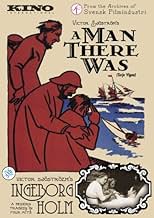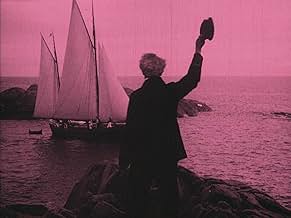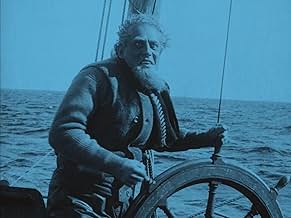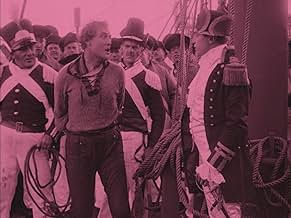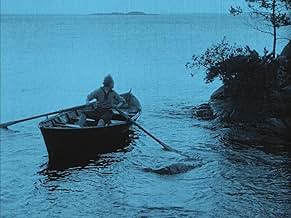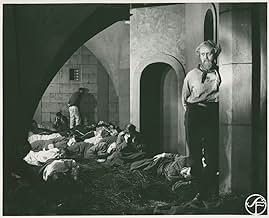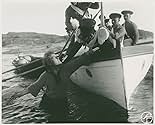IMDb RATING
7.3/10
2.5K
YOUR RATING
Terje Vigen, a sailor, suffers the loss of his family through the cruelty of another man. Years later, when his enemy's family finds itself dependent on Terje's beneficence, Terje must decid... Read allTerje Vigen, a sailor, suffers the loss of his family through the cruelty of another man. Years later, when his enemy's family finds itself dependent on Terje's beneficence, Terje must decide whether to avenge himself.Terje Vigen, a sailor, suffers the loss of his family through the cruelty of another man. Years later, when his enemy's family finds itself dependent on Terje's beneficence, Terje must decide whether to avenge himself.
- Director
- Writers
- Stars
Eric Abrahamsson
- En fiskare
- (uncredited)
Hildur Carlberg
- En kvinna i byn
- (uncredited)
Gucken Cederborg
- Den nya hustrun i Terjes stuga
- (uncredited)
John Ekman
- Norsk fånge i fängelset
- (uncredited)
Nils Elffors
- En av Terjes kamrater (1)
- (uncredited)
Emil Fjellström
- En fiskare på stranden
- (uncredited)
Julius Hälsig
- Engelsk officer i fängelset
- (uncredited)
Herman Lantz
- En av Terjes kamrater (2)
- (uncredited)
William Larsson
- Den nye mannen i Terjes stuga
- (uncredited)
- …
Gunnar Norberg
- Self
- (uncredited)
Hans Sjöblom
- En liten pojke
- (uncredited)
Nanny Sjöblom
- Mor med son i knäet
- (uncredited)
Fritz Ström
- Vitskäggig gammal gubbe
- (uncredited)
Jenny Tschernichin-Larsson
- En kvinna på stranden
- (uncredited)
- Director
- Writers
- All cast & crew
- Production, box office & more at IMDbPro
Featured reviews
Beautiful cinematography along the rugged Norwegian coastline and a powerful message of forgiveness are the highlights of this film from Victor Sjöström, which was a landmark in its day. It's Ibsen's story of a man who tries to get past a British blockade to feed his hungry wife and baby, but is caught and imprisoned for five years. By the time he gets home, they've perished. I went in unfamiliar with the story and thought it might be a Tarantino-like tale 1917-style, especially when the man comes across the British captain who showed him no mercy and has a chance for vengeance. It's such a touching thing that he doesn't do so given the depths to which mankind was sinking in WWI at the time.
Channeling Christ really gives an extra meaning to the backlit crosses we see in the cemetery in one of the film's beautiful shots. Another that stands out in my mind is the old man sitting and staring out at the sunset over the water, and there is real depth of feeling throughout the film. The only reason for the slightly lower review score was the overall pace, which I found slow for such a simple story, with the exception of the scenes of tension. Sjöström immerses us so well into this world we can practically taste the sea salt and I love him for it, I just wish there had been a little meat on the bones of this story. On another night my score may have been higher, and this is worth seeing though.
Channeling Christ really gives an extra meaning to the backlit crosses we see in the cemetery in one of the film's beautiful shots. Another that stands out in my mind is the old man sitting and staring out at the sunset over the water, and there is real depth of feeling throughout the film. The only reason for the slightly lower review score was the overall pace, which I found slow for such a simple story, with the exception of the scenes of tension. Sjöström immerses us so well into this world we can practically taste the sea salt and I love him for it, I just wish there had been a little meat on the bones of this story. On another night my score may have been higher, and this is worth seeing though.
For students of film, this is a must-see. Sjostrom proved to be highly influential in the development of Scandanavian and Northern European film. His output was prolific, but TERJE VIGEN is one of my favorites-- it captures well the angst and anxiety so pregnant among Scandanavian and Danish masters (Dreyer and Bergman come to mind as spiritual successors/contemporaries of Sjostrom). TERJE VIGEN, in particular, is one of those stories that will haunt but also reward. The cinematography is what one would expect of a film that is literally more than 100 years old-- innovative for its time, it is very subtle. Where this film really shines is in the phenomenal acting, especially by Sjostrom himself.
Terje Vigen (1917) directed by and starring the father of Swedish cinema, Victor Sjöström, is a true masterpiece of early cinema.
The story is simple and revolves around Terje Vigen, a sailor, who suffers the loss of his family through the cruelty of another man. Years later, when his enemy's family finds itself dependent on Terje's beneficence, Terje then must decide whether to avenge himself.
When comparing Terje Vigen to its peer films of the 1910's such as L'Inferno (1911), From the Manger to the Cross (1912), The Straw Man (1914), Birth of a Nation (1915) and even the masterful Intolerance (1916), what stands out in Sjöström's film making is it's emotional impact rather than its production design or acting prowess. It is a mature depiction of human pain, suffering and redemption, that far succeeds its historical immaturity. Also particularly noteworthy is Rodulf Sahlberg's amazing score for the film.
Ii highly recommended it for film buffs and those interested in cinema history. Victor Sjöström's protegé, Ingmar Bergman would continue the beginning of the Swedish film making legacy in becoming one of cinema history's most revered directors.
The story is simple and revolves around Terje Vigen, a sailor, who suffers the loss of his family through the cruelty of another man. Years later, when his enemy's family finds itself dependent on Terje's beneficence, Terje then must decide whether to avenge himself.
When comparing Terje Vigen to its peer films of the 1910's such as L'Inferno (1911), From the Manger to the Cross (1912), The Straw Man (1914), Birth of a Nation (1915) and even the masterful Intolerance (1916), what stands out in Sjöström's film making is it's emotional impact rather than its production design or acting prowess. It is a mature depiction of human pain, suffering and redemption, that far succeeds its historical immaturity. Also particularly noteworthy is Rodulf Sahlberg's amazing score for the film.
Ii highly recommended it for film buffs and those interested in cinema history. Victor Sjöström's protegé, Ingmar Bergman would continue the beginning of the Swedish film making legacy in becoming one of cinema history's most revered directors.
I've been wanting to see more Sjostrom, hoping for something on the level of PHANTOM CARRIAGE. Although this one has nothing but rave reviews on IMDb, it didn't grab me as much. A melodrama about a man driven mad by tragic misfortune and cruelty, but it's hard to feel too sorry for him because he really didn't have a very good plan. Maybe I'm being harsh, but despite a strong performance by Sjostrom I just wasn't emotionally invested enough to care that much about his troubles. However, technically it's very impressive for its time and features some stunning nautical cinematography and a haunting final image that serves as a strong counterpoint to the redemptive theme. You can also see Sjostrom's man vs. nature motif emerging, further developed in THE OUTLAW AND HIS WIFE and of course THE WIND.
Made by the legendary Victor Sjöström at the dawn of cinema, this 1917 picture is a true masterpiece, as per usual when it comes to Sjöström.
The art of silent filmmaking is one somewhat lost in time, focusing almost exclusively on the visual language and cinematography - and in that department, Terje Vigen shines. It's such a beautifully shot movie and the slow pacing and long shots tell so much more than any words ever could.
The story itself is very well-written as well, and the actors do a good job of conveying the characters.
Overall, one of the most important and innovative films ever made!
The art of silent filmmaking is one somewhat lost in time, focusing almost exclusively on the visual language and cinematography - and in that department, Terje Vigen shines. It's such a beautifully shot movie and the slow pacing and long shots tell so much more than any words ever could.
The story itself is very well-written as well, and the actors do a good job of conveying the characters.
Overall, one of the most important and innovative films ever made!
Did you know
- GoofsA title card references the year of the blockade as 1809. Great Britain and Sweden were allies in 1809, so there was no blockade. However, after she was forced to make peace with France after losing The Finnish War and the Pomeranian War, Sweden declared war against Great Britain. The Anglo-Swedish War (1810-1812) existed only on paper: British ships were still allowed to dock on the island of Hanö and trade with the Baltic states. Great Britain blockaded Sweden during World War I.
- Quotes
[first lines]
Title Card: On a barren, remote islet, there lived an odd, grizzled man.
- ConnectionsEdited into Catalogue of Ships (2008)
Details
Box office
- Budget
- SEK 60,000 (estimated)
- Runtime
- 1h 5m(65 min)
- Color
- Sound mix
- Aspect ratio
- 1.33 : 1
Contribute to this page
Suggest an edit or add missing content

